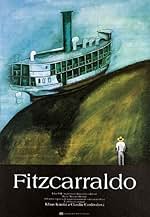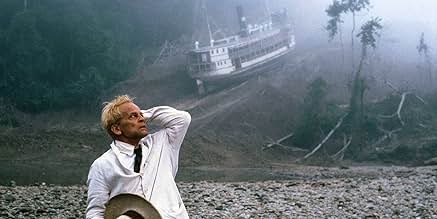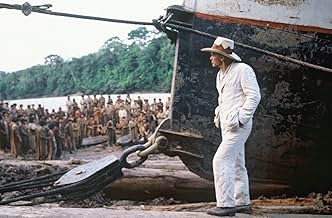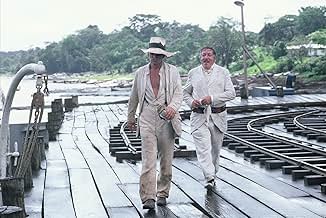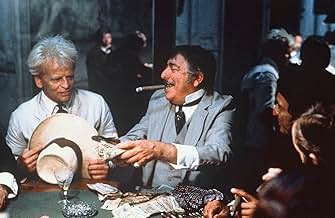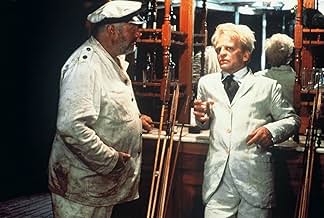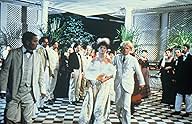Die Geschichte von Brian Sweeney Fitzgerald, einem äußerst entschlossenen Mann, der mitten im Dschungel ein Opernhaus errichten will.Die Geschichte von Brian Sweeney Fitzgerald, einem äußerst entschlossenen Mann, der mitten im Dschungel ein Opernhaus errichten will.Die Geschichte von Brian Sweeney Fitzgerald, einem äußerst entschlossenen Mann, der mitten im Dschungel ein Opernhaus errichten will.
- Nominiert für 1 BAFTA Award
- 4 Gewinne & 4 Nominierungen insgesamt
- Cholo
- (as Miguel Angel Fuentes)
- Huerequeque (The Cook)
- (as Huerequeque Enrique Bohórquez)
- Station master
- (as Grande Othelo)
- Rubber Baron
- (as Rui Polanah)
- Old Missionary
- (as Salvador Godinez)
- Notary
- (as Bill Rose)
- Opera Singer
- (Nicht genannt)
- Opera Singer
- (Nicht genannt)
- Wilbur (scene cut)
- (Nicht genannt)
Empfohlene Bewertungen
This seems especially true of "Fitzcarraldo," which, sets a hundred years ago, begins with an Irish colonist who had a passion for opera rowing 1,200 miles down a South American river, accompanied by the madam of a brothel, in order to hear the great Caruso perform
Inspired by this experience, Fitzcarraldo embarks on a grandiose plan to open up the Amazonian jungle to river transport, providing access to new rubber plantations and thereby making enough money to build an opera house
Herzog's favorite actor, Klaus Kinski, is as appropriately manic as Fitzcarraldo, eyes glittering madly as he pursues his vision In the central sequence he organizes a tribe of Indians to help him pull a steamboat across a mountain in order to by-pass dangerous rapids
"Fitcarraldo" seems by turns admiring of its hero's megalomania and mocking of his hubris, with no illusions about the cynical exploitation of the region's riches by the rubber barons whom Fitzcarraldo tries to defeat by cleverness Ultimately though, it is the sheer spectacle which we remember
With his white coat, white hat, and his bleached blonde hair, Fitz is quite an eccentric. In a social context, he's an outsider. But he has a bold vision. His romantic sidekick is a woman named Molly (Claudia Cardinale). As a compliment to Fitz, she speaks the film's theme: "It's only the dreamers who move mountains".
After some preparation early in the film, Fitz and crew set sail up the Amazon on a huge boat, to stake out a claim for their business that will bring in the money to advance Fitzcarraldo's dream. The boat is equipped with all the necessities, which include, naturally, a gramophone to play the operatic music of Enrico Caruso. And the best sequences of the film are those set in the remote jungle, as the boat moves through a large tributary of the Amazon, into headhunter territory. With the gramophone blaring out opera amid the sound of Indian war drums, it's the unusual contrast between the primitive and the cultural that makes this film interesting.
Filmed entirely in South America, the story is set in the early years of the twentieth century, long before the advent of television or automobiles.
Color cinematography is quite good. This is a very physical story. Most scenes take place outdoors. And the remoteness of the setting conveys a sense of doom, a sense of unknown terror and foreboding.
While the visuals are stunning, some aspects of the story I'm just not sure about. I never did figure out the significance of the ice. Is that a reward for Indian cooperation? If so, how can ice be preserved in a land without electricity? And without electricity, isn't the whole idea of an opera house in the wilderness a tad ludicrous? Maybe these questions are all answered and I just missed them. Even so, these issues could have been better addressed in the script.
Not as deeply thematic as "Aguirre: The Wrath Of God" (1972), Werner Herzog's "Fitzcarraldo" nevertheless is an unusual film, one that is worth watching for its stunning visuals and thematic contrasts, its physicality, and the eccentric character of Fitzcarraldo, the dreamer who can move mountains.
The most famous image in the film is the hauling of a large steam-boat up the side of a mountain (a feat which was achieved by the film-makers without the aid of special effects). Visually, the film is spectacular and everything is beautifully photographed. Kinski is superb as the crazed adventurer.
On the minus side, however, some viewers might be put off by the slow pace of the film.
This film stands as one of Herzog's best, and most accessible works, and is a must-see for anyone.
Wusstest du schon
- WissenswertesKlaus Kinski was a major source of tension on set, because he fought violently with the crew and raged over trivial matters. The natives were very upset about his behavior. Werner Herzog has claimed that one of the chieftains offered, in all seriousness, to murder Kinski. However, Walter Saxer, the production manager of this film, later confirmed that Herzog's story was not true.
- PatzerDuring one of boat drifting scene, crew members are visible at the top of the boat, including a man in jeans who tries to avoid the camera.
- Zitate
Brian Sweeney Fitzgerald - 'Fitzcarraldo': How can anyone learn patriotism from a school book?
Young Missionary: The Government requires it.
Old Missionary: The natives get used to it. Like vaccination.
Young Missionary: The children already feel like little Peruvians. The other day I asked them, "Are you Indians?" "No," they said, "not we, the ones up the river, they are Indians." And then I asked. "What are Indians?" "They said to me "Indians are people who can't read and who don't know how to wash their clothes."
Brian Sweeney Fitzgerald - 'Fitzcarraldo': And what about the older people?
Old Missionary: Well, we can't seem to cure them of the idea that our everyday life is only an illusion, behind which lies the reality of dreams.
Brian Sweeney Fitzgerald - 'Fitzcarraldo': Actually, I'm very interested in these ideas. I specialise in opera myself.
- VerbindungenEdited into Spisok korabley (2008)
- SoundtracksOpera in Manaos
from "Ernani" by Giuseppe Verdi
Production: Werner Schroeter
Ernani: Veriano Luchetti (voice)
Costante Moret (actor)
Silva: Dimiter Petkov (voice and actor)
Elvira: Mietta Sighele (voice)
Singer at orchestra: Lourdes Magalhaes
Sarah Bernhardt: Jean-Claude Dreyfus (as Jean-Claude Dreyfuss)
Stage design: Gianni Ratto
Orchestra of the Filarmonica Veneta
Conducted by Giorgio Croci
Top-Auswahl
- How long is Fitzcarraldo?Powered by Alexa
Details
- Erscheinungsdatum
- Herkunftsländer
- Sprachen
- Auch bekannt als
- Фіцкарральдо
- Drehorte
- Plaza de Armas, Iquitos, Peru(Fitzcarraldo's house)
- Produktionsfirmen
- Weitere beteiligte Unternehmen bei IMDbPro anzeigen
Box Office
- Budget
- 14.000.000 DM (geschätzt)
- Weltweiter Bruttoertrag
- 4.475 $

